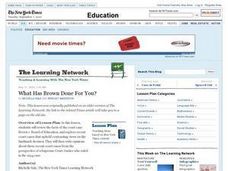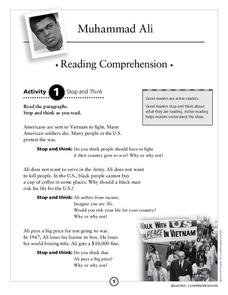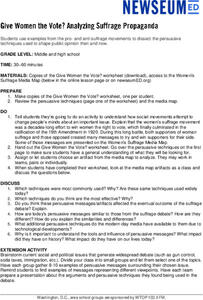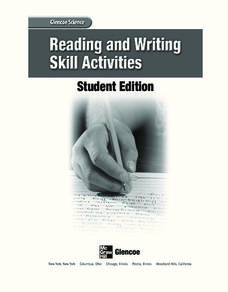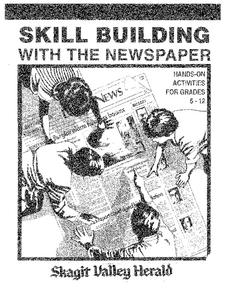Curated OER
What Has Brown Done for You?
Learners review the facts of the court case Brown v. Board of Education. Next, they research recent court cases that uphold contrasting views on the landmark decision. They write opinions about these recent court cases from a 1954...
Curated OER
Pay to Play?
Lead your class in a discussion about how they believe money influences politics. After reading "Go Ahead, Try to Stop K Street" from the New York Times, they evaluate the claims in the article about the current lobbyist scandal in...
Curated OER
What a Relief!
How are disasters addressed by the Federal Government? This New York Times lesson, based on the article "Disaster Aid: The Mix of Mercy and Politics," prompts middle schoolers to discuss the idea of using a disaster declaration as a...
Curated OER
In God We Trust; All Others Pay Cash
Learners review their knowledge on the First Amendment. After reading an article, they identify specific church and state issues. Using the Internet, they research President Bush's proposal from a specific point of view. They summarize...
Library of Congress
Muhammad Ali
Muhammad Ali was the greatest, as he'd tell you himself. A set of reading comprehension worksheets walks through parts of Ali's life and promotes individuals to become good readers and writers.
Curated OER
Family Life
What is family? Challenge your scholars to write an encompassing definition of what this word means to them. After reading "It May Be a Family Matter, But Just Try to Define Family," class members discuss the emotional issues surrounding...
Warren County Public Schools
Citing Textual Evidence
By using explicit textual evidence, individuals can strongly support their ideas and opinions. The presentation suggests in order to use explicit textual evidence, one must state their idea, cite evidence in the text that led to the...
Scholastic
Persausive Writing
A unit on persuasive writing guides elementary learners through the writing process. The first part examines the elements of persuasive writing, including expressing an opinion, connecting ideas, using supporting facts, and writing...
PBS
Racial Equality: How Far Have We Come and How Far Do We Have To Go?
Is everyone treated fairly in America? The culminating fifth lesson from a series of five has pupils explore racial inequalities from the 1960s and decide whether or not society has changed over time. The lesson comes with a speech from...
Newseum
Is This Story Share-Worthy?
Young journalists use a "Is This Story Share-Worthy?" flowchart graphic to decide whether a story is worth sharing online. Instructors provide groups with fake news, poor quality stories, opinion pieces, biased news, and high-quality...
Newseum
Confronting Conformation Bias
Be curious! Seek out different opinions! Be conscious of your thinking process! After reading an article about confirmation bias and motivated reasoning, class members apply these strategies to the topic of school start times. They read...
Newseum
Give Women the Vote? Analyzing Suffrage Propaganda
Propaganda is often used to shape public opinion. Scholars investigate the persuasive techniques used by the pro- and anti-suffrage movements. Groups compare how these devices were used during the suffrage movement with how the same...
Curated OER
Powers of Persuasion
Did you know that clothing and textiles can be recycled, just like glass, paper, aluminum, and plastic? Pupils are introduced to textile recycling and design persuasive posters or letters that raise awareness about this unique type of...
Teacherfiles
Thumbs Up, Thumbs Down
Encourage your pupils to express their opinions about why they are reading, both positive and negative. After filling in the title and author of the text, individuals write down two things they liked and two things they disliked. They...
Newseum
Propaganda Through History: Analyzing Historical Sources
Working in teams, pairs, or individually, scholars select one resource from a gallery of historical sources and consider which examples might be considered propaganda, the techniques used to persuade audiences, and evaluate how the...
Student Handouts
Why Does an Author Write?
To get to the heart of a writer's purpose, just remember to have some PIE (Persuade, Inform, or Entertain)! And appropriately, here is a PIE chart that leaves room for pupils to identify each letter of the acronym and any other ideas or...
Curated OER
Reading and Writing Skills Activities
A straightforward and thorough packet of reading exercises would be a solid addition to any reading unit. With worksheets that address various writing and reading skills, including word roots, narrative writing, evaluating text, and...
CJ Hatcher & Associates, Inc.
Skill Building with the Newspaper
Extra, extra, read all about it! Use a newspaper as the primary resource in a special education classroom to teach reading, writing, and math skills. The activities help class members build their reading skills as well as their knowledge...
American University
Factitious
Truth or factitious? Users of an engaging interactive test their ability to identify whether an article is real or fake news.
Newseum
Bias Through History: Analyzing Historical Sources
Young journalists use the E.S.C.A.P.E. (evidence, source, context, audience, purpose, and execution) strategy to evaluate historical and contemporary examples of bias in the news. The class then uses the provided discussion questions to...
Center for Open Educational Resources and Language Learning
Reading Activity
Ready to integrate technology into your ELL instruction? Check out this reading lesson that has language learners using the Internet and apps, joining online book clubs, and creating blogs. A fine model of what can be done.
The New York Times
The Careful Reader: Teaching Critical Reading Skills with the New York Times
The 11 lessons in this educators' guide focus on using newspapers to develop critical reading skills in the content areas.
Scholastic
Marijuana: Breaking Down the Buzz
There are a lot of myths surrounding marijuana. Read a passage that clarifies the dangers of teens smoking marijuana, its harmful effects on the development of the brain, and the possible correlation of cigarette smoking to marijuana...
EngageNY
End of Unit 1 Assessment: Drawing Evidence from Text: Written Analysis of How Percy’s Experiences Align with “The Hero’s Journey”
Do your best on the test! Readers finish up by completing the end of the unit assessment. Using the assessment, writers describe how Percy's experiences in The Lightning Thief align to four parts of The Hero's Journey. After completing...
Other popular searches
- Facts and Opinions
- Facts or Opinions
- Fact and Opinions
- Expressing Opinions
- Forming Opinions
- Esl Expressing Opinions
- Express Opinions
- Facts & Opinions
- Sharing Opinions
- Fact vs Opinions
- Free Facts or Opinions
- Facts vs. Opinions


